According to GCV Analytics, in April, the number of corporate-backed deals from around the world stood at 447, up 19% from the 375 rounds from the same month last year. Investment value stood at $18.92bn in total estimated capital – comparable to the $21.81bn of April 2021. The US came first in the number of corporate-backed deals, hosting 192 rounds, while Japan was second with 53 and India third with 31.
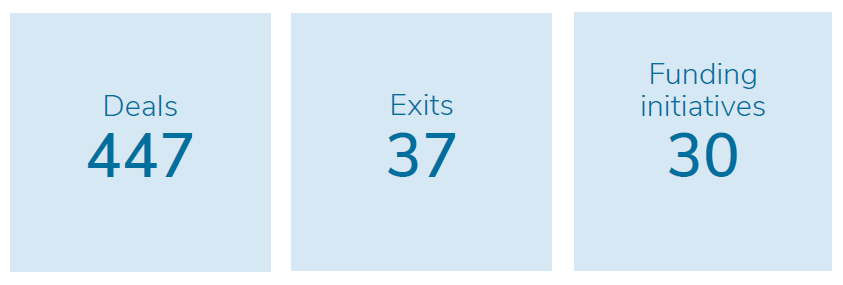
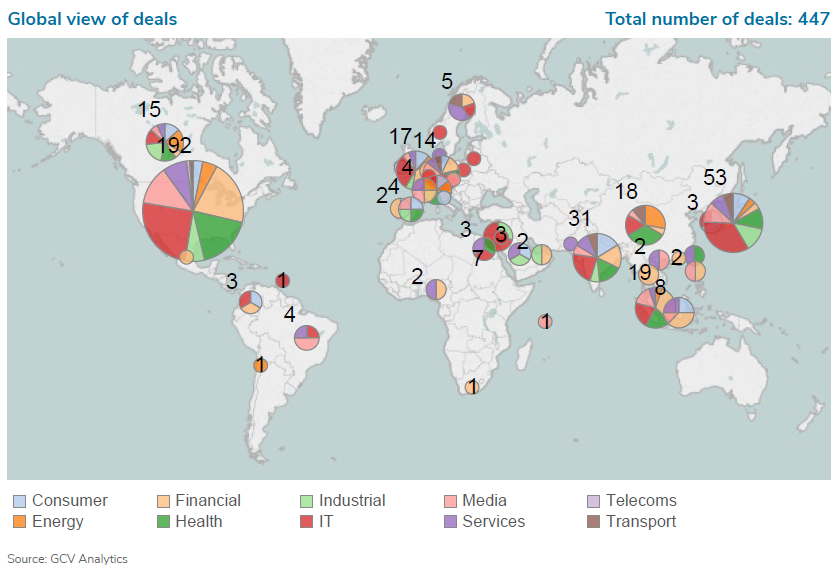
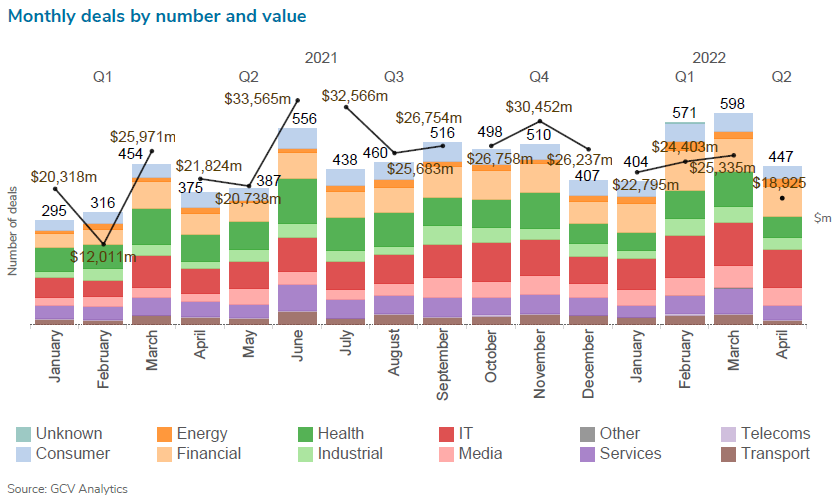
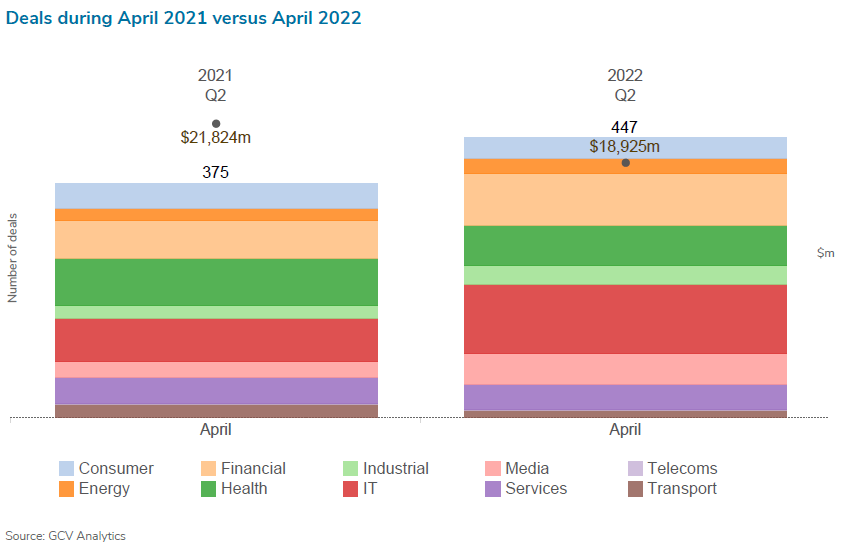
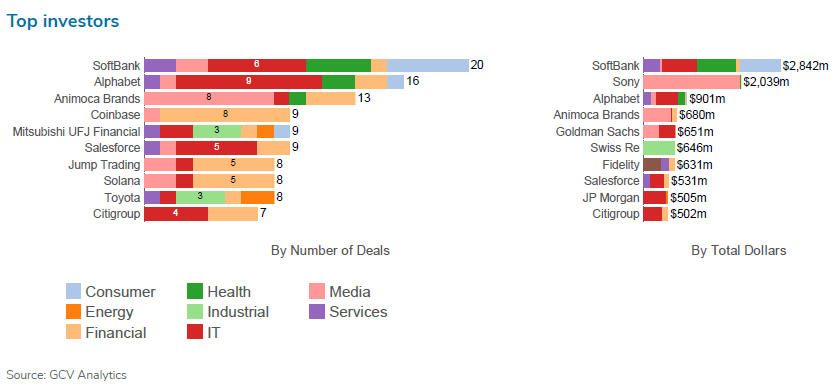
The leading corporate investors by number of deals were telecoms and internet conglomerate SoftBank, internet conglomerate Alphabet, gaming and blockchain technology group Animoca Brands and crypto asset exchange Coinbase. In terms of involvement in the largest deals, SoftBank, electronics producer Sony and Alphabet were at the top of the list.
GCV Analytics reported 30 corporate-backed funding initiatives, including VC funds, new venturing units, incubators, accelerators and other. This figure was 45% smaller than the one from April 2021, which had registered 55 such initiatives. The estimated capital stood at $3.61bn, roughly comparable with the $3.84bn from the same month last year.

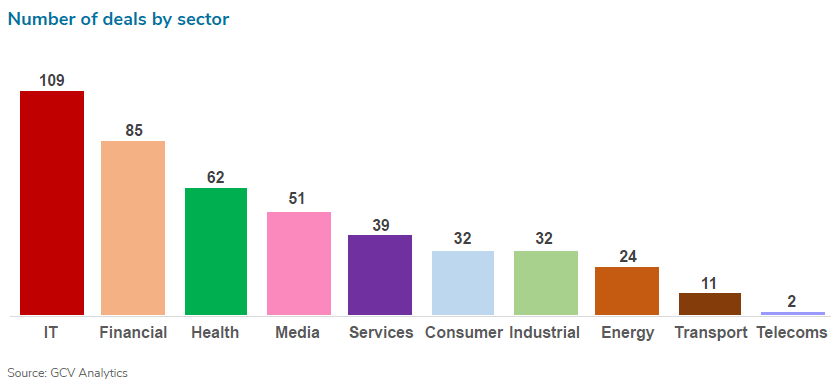
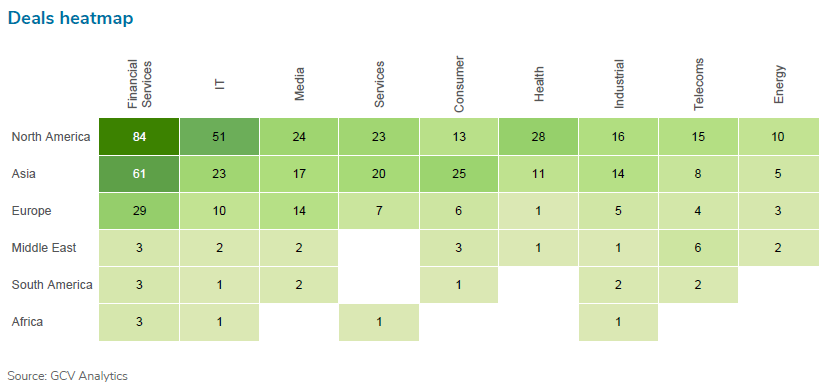
Deals
Emerging businesses from the IT, financial health and media sectors led in raising the largest number of rounds in fourth month of 2022. The most active corporate venturers came from the financial, IT, media and services sectors, as shown on the heatmap before.
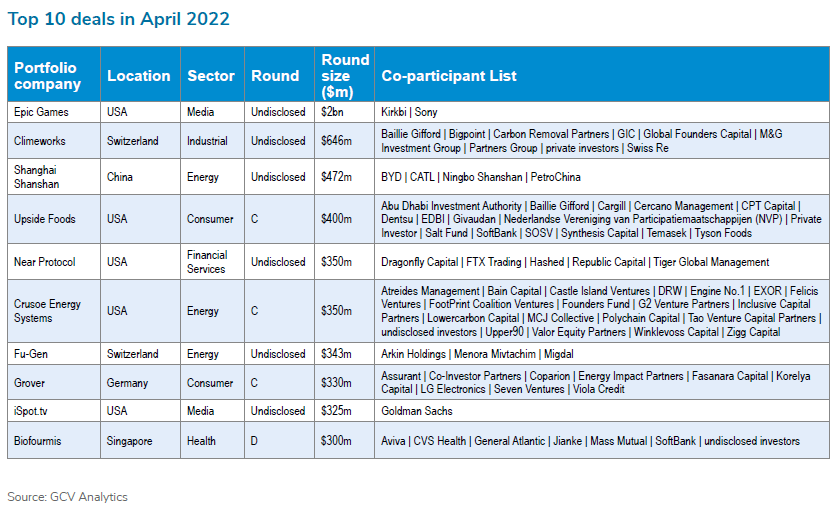
Consumer electronics group Sony joined Kirkbi, the parent company of toy brand Lego, to each invest $1bn in US-headquartered video game producer Epic Games at a $31.5bn valuation. Kirkbi’s investment came after Lego announced a partnership agreement with Epic focusing on metaverse gaming products. Epic is the developer of game franchises including shoot-em-ups Gears of War, Unreal and Fortnite, the battle royale shooter which had generated in excess of $9bn in revenue in its first three years of release and which has just added Marvel characters for its latest season. All the company’s games make use of Unreal Engine, a proprietary game engine it also licenses to other developers. The engine has been utilised in game series such as Mass Effect and Batman: Arkham Asylum.
Switzerland-headquartered carbon capture technology provider Climeworks revealed it had agreed to raise CHF600m ($646m) of equity funding from investors including reinsurance firm Swiss Re. Partners Group and GIC co-led the round, which also featured Baillie Gifford, Carbon Removal Partners, Global Founders Capital, M&G, BigPoint Holding and private investor John Doerr, while JP Morgan Securities was sole placement agent for the deal. Climeworks has developed technology designed to pull carbon from the air and has 15 such systems in use, having launched what it describes as the world’s largest direct air capture and storage facility in Iceland in September 2021.
China-listed lithium battery provider Ningbo Shanshan was among the investors that have provided RMB3.05bn ($472m) in funding for its Shanghai Shanshan Lithium Battery Material Technology subsidiary. Electric vehicle manufacturer BYD and battery producer Contemporary Amperex Technology (CATL) also took part in the round, together with oil and gas supplier PetroChina’s Kunlun Capital unit and CATL-backed vehicle Wending Investment, at a valuation of $1.5bn. Formed in 2014, Shanghai Shanshan develops and manufactures lithium-ion battery anodes and carbon materials. Ningbo Shanshan itself began life as an apparel vendor in 1992 before eventually shifting its business to focus on energy transition.
US-based cultivated meat producer Upside Foods completed a $400m series C round backed by multiple corporates at a valuation of over $1bn. SoftBank’s Vision Fund 2, agribusiness Cargill, meat producer Tyson Foods, marketing firm Dentsu and flavour and fragrance ingredients producer Givaudan all took part in the round, which was co-led by Temasek and Abu Dhabi Growth Fund. Founded in 2015 as Memphis Meats, Upside cultivates meat from real animal cells, providing real meat without killing animals. Cultivated meat of this kind has been prohibitively expensive so far but those costs are set to decrease as it transitions to a commercial phase. Upside will use the capital to build a new production facility capable of producing tens of millions of pounds of cultivated meat in both minced and whole-cut formats. It will also grow its team and marketing efforts, boost research and development and develop its supply chain.
US-based blockchain deployment platform developer Near Protocol secured $350m from investors including cryptocurrency exchange FTX’s corporate venturing arm, FTX Ventures. Investment firm Tiger Global Management led the round, which included Republic Capital, Hashed and Dragonfly Capital. The deal reportedly valued the company at $10bn. Near Protocol has built a crypto protocol dubbed MainNet that helps developers design and optimise decentralised applications across areas such as business contracts and gaming merchandise.
US-based clean computing technology provider Crusoe Energy Systems secured $350m in series C equity funding from investors including conglomerate and principal trading firm DRW alongside $155m in debt financing. G2 Venture Partners led the equity portion, which included Exor Seeds, a subsidiary of diversified holding company Exor, and Bain Capital Ventures, the venture capital arm of private equity firm Bain Capital, while DRW invested through its DRW Venture Capital vehicle. The equity funding was closed together with up to $155m in credit facilities from SVB Capital and other investors. Founded in 2018, Crusoe uses waste gas, which would otherwise be burned at the well site, to power a network of data centres and minimise the use of new energy. It will use the funding to develop large-scale Bitcoin mining and cloud computing infrastructure while growing its team.
Switzerland-headquartered renewable power producer Future Generation (Fu-Gen) received €320m ($343m) in funding from investors including insurance providers Migdal and Menora Mivtachim. Family office Arkin Group filled out the participants in the round, with each investor providing about €100m through equity funding in the company, financing for its newly formed Fu-Gen Assets 4 Platform and co-investment rights in its projects. Founded in 2017, Fu-Gen is working on greenfield renewable energy infrastructure including wind and solar power projects across the Nordic countries. It has more than 1.5 GW of assets in development. The funding will be used to boost work on the company’s onshore wind, solar and green hydrogen projects.
Germany-based electronics rental service Grover received $330m in debt and series C equity financing from investors including insurance provider Assurant, media company ProSiebenSat.1 and electronics manufacturer LG. The $110m equity portion of the round was led by Energy Impact Partners and also featured German Media Pool, the ad-for-equity vehicle formed by several domestic media companies, as well as Co-Investors Partners, Korelya Capital, Viola Fintech and Coparion. Grover was valued at over $1bn in the equity portion. Founded in 2015, Grover provides a subscription-based service where online users can rent technology devices rather than own them, making them available to users who may not be able to afford them outright and reducing electronics waste by returning, refurbishing and recirculating items until the end of their useful life.
Advertising measurement services provider iSpot.tv raised $325m of venture funding from Goldman Sachs Asset Management, putting its pre-money valuation at an estimated $675m. The funding will be used to accelerate growth and adoption of real-time, cross-platform TV ad verification, audience measurement and performance metrics for both the buy and sell side. Founded in 2007, Ace Metrix has built an analytics platform that helps consumer brands measure the impact of their television and video advertising. The company was previously backed by public relations agency WPP.
US-headquartered remote care technology developer Biofourmis secured $300m in series D funding from investors including pharmacy chain operator CVS Health at a $1.3bn valuation. Growth equity firm General Atlantic led the round, which also featured undisclosed existing investors. It brought the total raised by Biofourmis to $445m, the company said. Founded in Singapore in 2015, Biofourmis has built an artificial intelligence-driven software platform that helps healthcare professionals analyse medical data to provide specialist care for patients suffering from chronic conditions and diseases including heart failure, cancer and acute coronary syndrome.
Exits
GCV Analytics tracked 37 exits involving corporate venturers as either acquirers or exiting investors in April. The transactions included 28 acquisitions, five initial public offerings (IPOs), three other transactions and one merger of equals. The exit count was lower than the April 2021 figure (56). The total estimated exited capital stood at $6.05bn, considerably smaller than the $9.73bn from same month last year. These figures continue to suggest that public and M&A market are no longer as buoyant as they were last year, which makes sense in light of inflation issues and interest rate hikes.
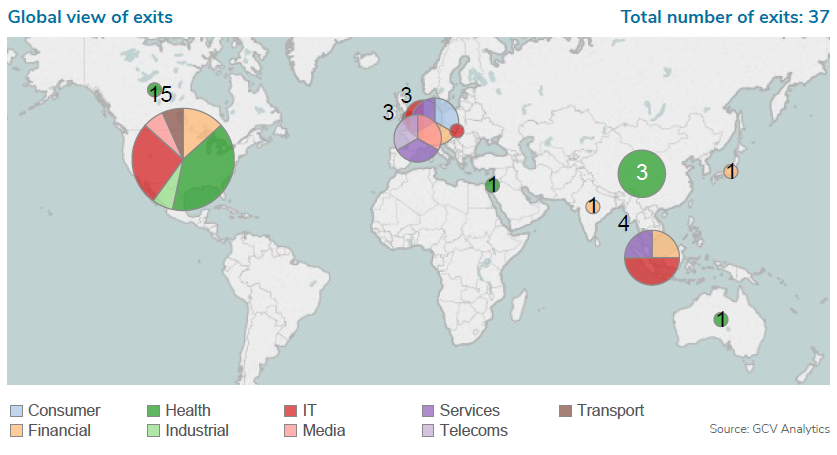
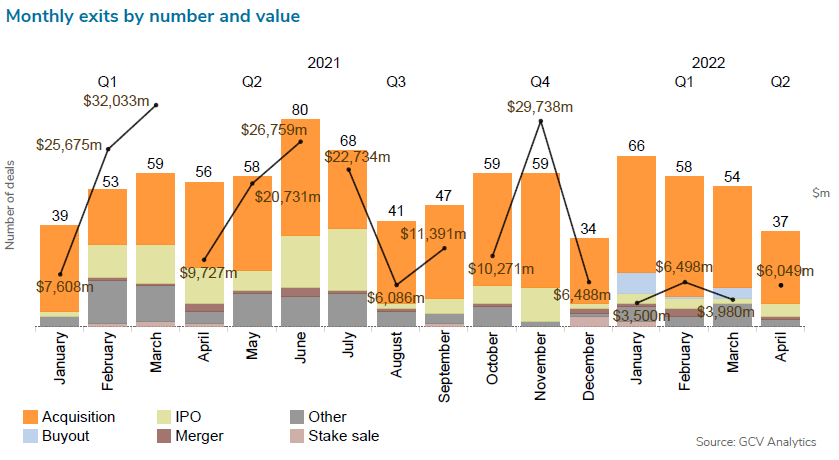
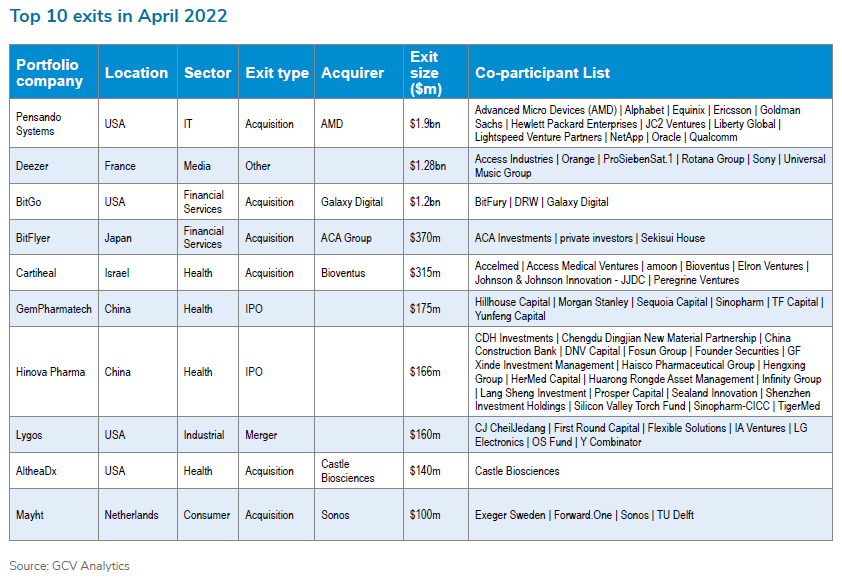
Semiconductor producer AMD agreed to acquire US-based edge computing technology provider Pensando in a $1.9bn deal allowing several corporates to exit. Previous corporate backers included enterprise technology producer Hewlett Packard Enterprise (HPE), data centre operator Equinix, Alphabet, communications equipment maker Ericsson, cloud data services provide NetApp, database provider Oracle, mass media group Liberty Global and chipmaker Qualcomm. Pensando has developed a distributed, programmable processor and software platform to help customers’ existing network architecture function more like cloud networks in order to support high-velocity applications.The company claims its technology yields eight to 13 times better performance than competitive products, and the purchase would help AMD compete with the likes of Nvidia and Intel’s data centre chip businesses.
Deezer, the France-headquartered online audio streaming service backed by corporates Access Industries, Orange, Rotana, ProSiebenSat.1, Universal Music Group (UMG), Sony and EMI, agreed to list through a reverse takeover. The company is set to join forces with I2PO, a special purpose acquisition company that floated on the Euronext Paris market in July 2021, in a deal valuing it at €1.05bn ($1.13bn) pre-money. The transaction will be boosted by approximately $146m in private investment in public equity (PIPE) financing from investors including conglomerate Access Industries and its Warner Music subsidiary, fellow record company UMG, publisher Media Participations and telecommunications firm Orange. Deezer runs an online platform which allows users to stream music and audio content such as podcasts through a freemium model. It had 9.6 million paying subscribers as of the end of 2021, a year when it generated $453m in revenue but made a net loss of nearly $140m.
Cryptocurrency financial services provider Galaxy Digital Holdings renegotiated the terms of its $1.2bn cash-and-stock acquisition of BitGo, a US-based digital asset wallet developer backed by Bitcoin mining technology provider BitFury and trading firm DRW, originally agreed in May 2021. The revised terms mean BitGo’s shareholders will acquire 44.8 million shares in Galaxy instead of 33.8 million, representing a 12% stake, up from 10%. BitGo is a digital custodian for crypto assets, providing technology currently responsible for safeguarding some $40bn of assets. It has also added crypto asset-based products like trading, prime lending, portfolio management and tax services to its offering.
Private equity firm ACA Group agreed to buy a majority stake in Japan-based, corporate-backed cryptocurrency exchange BitFlyer for an amount expected to be up to $370m. The shareholder group was backed by BitFlyer co-founder Minefumi Komiyama and construction firm Sekisui House, each of which holds about 13% of its shares. A group of the company’s shareholders led the sale negotiations to recoup their investments as the Tokyo Stock Exchange has banned public listings for digital currency exchanges and floating on an overseas market was expected to take too long. Founded in 2014, BitFlyer operates a digital exchange for cryptocurrencies such as Bitcoin, Ethereum and Litecoin.
Bioventus, a provider of products that aid healing, exercised a call option to purchase portfolio company CartiHeal, an Israel-based cartilage repair system developer, in a transaction involving it paying $315m for the shares it does not already own. The deal could be boosted by $135m in sales-related milestone payments and it follows a $15m investment by Bioventus in mid-2020. CartiHeal had raised a total of $56m as of 2018, from Johnson & Johnson Innovation – JJDC, part of medical product manufacturer Johnson & Johnson Innovation, as well as Bioventus, aMoon, Elron, Peregrine Ventures, Accelmed and Access Medical Ventures. CartiHeal is developing a porous, biocompatible calcium carbonate bio-scaffold called Agili-C that will be used to treat cartilage and osteochondral defects in the joints of the knee.
GemPharmatech, a China-based laboratory animal technology developer backed by pharmaceutical firm Sinopharm Group, listed on the Shanghai Stock Exchange (SSE) in an IPO sized at approximately $175m. The company issued 50 million shares on SSE’s Star Market priced at RMB22.53 ($3.51) each, with Huatai United Securities lead underwriter for the offering. Founded in 2017, GemPharmatech provides lab animal models and related services for biomedical product and therapeutics developers. It has built more than 20,000 commercial mouse models and claims to have accumulated the largest set of mouse strains in the world.
China-based cancer and metabolic disorder drug developer Hinova Pharmaceuticals floated in an IPO sized at approximately RMB1.06bn ($166m), enabling corporates Tigermed, Fosun, Haisco and Sinopharm to exit. The company issued nearly 24.8 million shares on Shanghai Stock Exchange’s Star Market, priced at RMB42.90 each, with Citic Securities lead underwriter for the offering. Hinova is working on therapeutics intended to treat cancer and metabolic diseases through targeted protein degradation. It initiated a phase 1 clinical trial for a metastatic castration-resistant prostate cancer drug candidate dubbed HP518 in January 2022. The IPO funds have been earmarked for drug development and the building of a research and development centre, new head office and a manufacturing facility, with some $157m set to go to construction of the head office in the city of Chengdu.
Lygos, a US-based sustainable ingredient producer backed by conglomerate LG and food and biotech producer CJ CheilJedang, agreed to merge with publicly listed biodegradable product manufacturer Flexible Solutions International in a deal set to be boosted by $160m in convertible note financing from unnamed investors. Corporate VC unit LG Technology Ventures invested $5m in Lygos in January 2019. Founded in 2010, Lygos has developed a full-stack biological engineering platform intended to generate microbial catalysts and specialty chemicals. The platform employs a combination of computational modeling, microbe engineering and screening along with deep learning to identify and develop new bio-routes to chemicals.
Medical test provider Castle Biosciences agreed to purchase AltheaDx, a US-based molecular diagnostics technology developer backed by pharmaceutical firm WuXi AppTec, for $32.5m in cash, $32.5m in shares and up to $75m in milestone payments. The company’s total funding stood at $68m as of a 2017 series D round and its investors include corporate VC unit WuXi Healthcare Ventures, Ally Bridge and Alma Life Sciences. Founded in 2008, AltheaDx is developing a molecular diagnostics platform called IDgenetix that will help care providers choose the right drugs and dosages for patients based on their genetic profile.
Audio equipment producer Sonos paid $100m in cash to purchase US-based disruptive transducer technology developer Mayht Holding, allowing solar cell technology provider Exeger to exit. Exeger had supplied an undisclosed amount of funding for Mayht in December 2021, and Delft Enterprises and Forward.One were also among the exiting investors. Founded in 2016, Mayht has developed audio technology designed to create and commercialise loudspeaker transducers. Its products use smaller casings without compromising the sound quality by housing powerful drivers in the casing.
Note: Monthly data can fluctuate as additional data is reported after each issue of GCV magazine goes to press.
